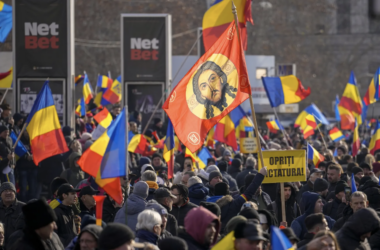Germany is gearing up for snap elections on February 23, 2025, following the collapse of Chancellor Olaf Scholz’s coalition government. This sudden turn of events, coming months ahead of the originally scheduled date, has thrown the political establishment into a frenzy. It underscores the hurdles of organizing a federal vote on short notice and raises critical questions about leadership and the nation’s direction.
After days of intense negotiations, the decision to hold the election in February was reached, but not without controversy. Chancellor Scholz and his Social Democrats (SPD) argued for a later date, citing the need to push through unfinished legislation and ensure ample preparation time. However, opposition parties, led by the Christian Democratic Union (CDU), accused Scholz of stalling for political gain. They pushed for an earlier election, exposing what many see as desperation within the current coalition to cling to power.
Even Germany’s election commissioner, Ruth Brand, waded into the fray, warning that a holiday-season election could strain resources, citing issues like paper shortages for ballots and staffing challenges. The CDU dismissed these claims as politically convenient excuses, aligning with growing skepticism of bureaucratic institutions perceived as favoring the status quo. Electoral officials in Berlin and other regions echoed concerns about the compressed timeline, but many citizens view such warnings as yet another example of mismanagement by an out-of-touch elite.
Logistical and Political Hurdles
The establishment has highlighted various logistical challenges tied to the February election:
- Ballot Printing Delays: A national paper shortage has raised fears that ballots, especially for postal votes crucial to Germans living abroad, won’t be ready on time.
- Staffing and Resource Constraints: Local election officials warn they’ll need to divert resources from essential municipal services to administer the vote, a move that could frustrate taxpayers.
- Winter Weather Risks: Snow and icy conditions might require extra measures, like clearing roads and providing heated polling stations, to ensure voter turnout.
While larger, entrenched parties like the CDU, SPD, and Greens can adapt to this accelerated timeline with relative ease, smaller parties face an uphill battle. The compressed schedule makes it harder for them to gather candidate signatures or build campaign infrastructure, disadvantaging fresh voices like Sahra Wagenknecht’s BSW and even the surging Alternative for Germany (AfD). Critics argue this system heavily favors established elites, stifling genuine political diversity.
A Pivotal Election Amid Polarization
This election comes at a critical juncture, with debates over immigration, energy policy, and economic uncertainty dominating discourse. Opposition parties, particularly the CDU and AfD, blame the current government for skyrocketing costs and a lack of leadership. Friedrich Merz, the CDU leader, has made hay of the coalition’s failures, but it’s the AfD that’s capturing public frustration.
The AfD’s meteoric rise, particularly in economically strained eastern Germany, represents a challenge to traditional power structures. By directly addressing voter concerns—such as border security, opposition to EU overreach, and dissatisfaction with costly climate policies—the party has positioned itself as a voice for the disenfranchised.
Systemic Barriers to Change
Despite its momentum, the AfD faces significant obstacles. Mainstream parties, clinging to their dominance, refuse to collaborate with the AfD, perpetuating the status quo. CDU leader Friedrich Merz has publicly rejected any coalition with the AfD, despite his party inching rightward on immigration. This ostracization, paired with relentless media attacks and allegations of extremism, reflects a coordinated effort by establishment forces to marginalize the AfD.
The proportional representation system further complicates transformative change. By requiring coalition-building, it forces compromises that dilute the influence of newer parties, maintaining control in the hands of entrenched elites. Voters increasingly question whether these mechanisms truly serve democracy or merely protect the globalist agenda.
AfD: A Rising Force
Polling at 18–19% nationally—nearly double its share from 2021—the AfD is leveraging dissatisfaction with Scholz’s coalition and broader EU policies. Its platform centers on:
- Border Security: Advocating strict immigration controls and mass deportations.
- Energy Independence: Opposing costly climate measures that harm German industry and families.
- National Sovereignty: Criticizing Germany’s subservience to Brussels and NATO, especially regarding Ukraine.
By tapping into these sentiments, particularly in the economically battered east, the AfD has become the choice for those disillusioned with traditional parties. Its ability to resonate with voters fed up with economic stagnation, cultural erosion, and endless bureaucracy marks it as a disruptive force.
A Shift Toward National Conservatism?
Germany’s political elite is quick to downplay the AfD’s ascent, but growing economic instability and frustration with establishment narratives suggest fertile ground for a broader national-conservative movement. Rising inflation, job insecurity, and energy crises have left many Germans yearning for leaders who prioritize their country’s needs over globalist agendas.
The AfD, already adept at utilizing social media and alternative platforms, continues to emphasize its commitment to safeguarding German identity and resisting foreign influence. These efforts resonate deeply in regions where traditional parties have failed to deliver, particularly as skepticism toward EU overreach and unchecked immigration grows.
While obstacles remain, the AfD’s rise could signal a turning point. If it successfully balances its outsider image with voter demands for pragmatic solutions, the party might not just reshape Germany’s political landscape—it could ignite a broader reckoning across Europe.




